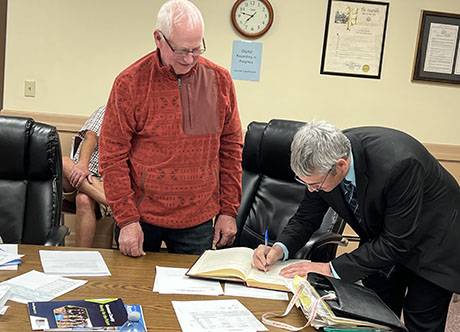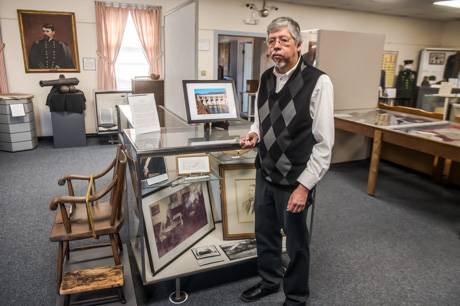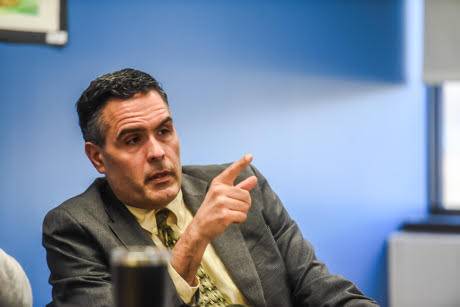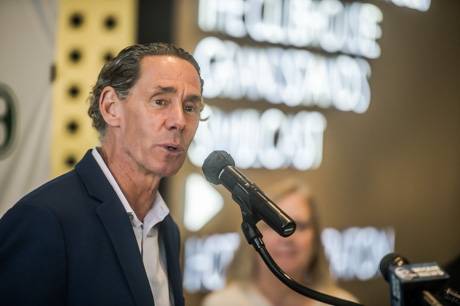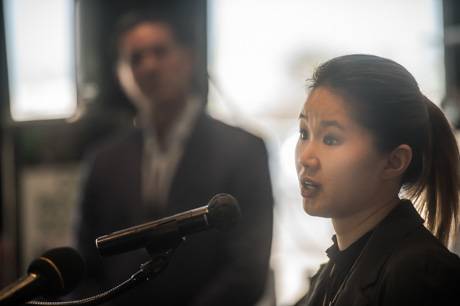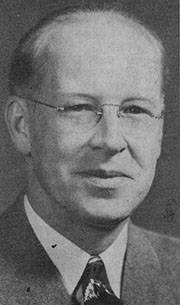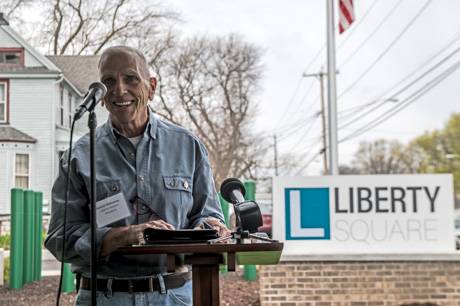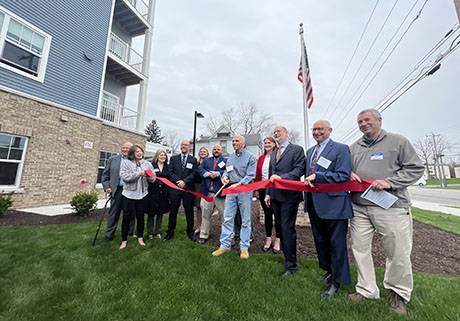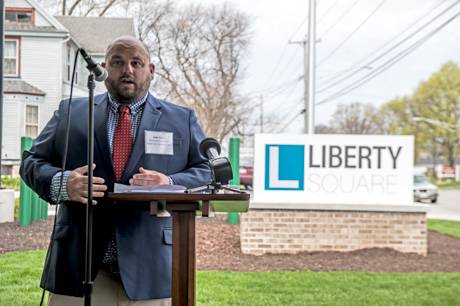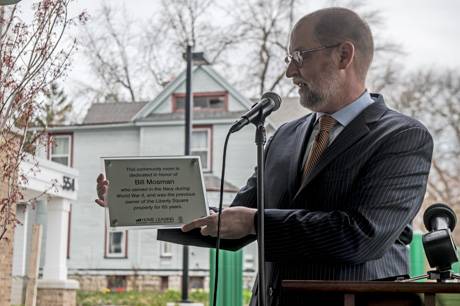Hailed as a hero and confidante of General Ulysses Grant, Ely Parker is mostly known by local historians and history buffs, even though the Native American celebrity of sorts was a Genesee County native and now graces the tail of a $1 Native American coin minted this year.
Don’t know about Ely Samuel Parker? The 2022 Native American $1 Coin honors him as a U.S. Army officer, engineer, and tribal diplomat who served as military secretary to Ulysses S. Grant during the U.S. Civil War. When Robert E. Lee surrendered at Appomattox, Virginia, on the morning of April 9, 1865, Parker rendered the formal surrender documents in his own hand. On the coin Parker is depicted in his Army uniform while a quill pen, book and what’s been called “his graceful signature” are included as symbols of his experience as a successful communicator. His tribe of Tonawanda Seneca and HA-SA-NO-AN-DA are inscribed to recognize his tribe and given birth name. The coin’s head design is of Sacagawea carrying her infant son, Jean Baptiste.
Terry Abrams, administrative coordinator of Tonawanda Reservation Historical Society, believes this coin is another piece of recognition for Parker.
“I think it's just one one more step in sort of recognizing, you know, the contributions that somebody like Ely Parker specifically had, not just locally but nationally,” Abrams said during an interview with The Batavian. “He was somebody who was a national figure during the Civil War and the Grant administration. So, that's something to note and something to acknowledge.”
He also noted that Parker was “really a sort of complicated figure,” as captured in one of Parker's biographies, Warrior in Two Camps. As intelligent, savvy, effective and versatile as Parker was, he was not always so highly regarded. As a Native American, Parker was not considered to be a United States citizen, he could not take the Bar exam to officially become a lawyer, and his application to join the Union Army as an engineer was denied, all due to his Native American status.
Who he was ...
There’s an exhibit about Parker at Holland Land Office Museum, and Genesee County Michael Eula has given talks about him during the Museum’s History Heroes youth program. Eula recapped Parker’s life, from being born into a large family in 1828 in Indian Falls as a Seneca Native American (part of the Tonawanda Reservation at the time) to studying law for three years and gravitating toward civil engineering at Rensselaer Polytechnic Institute. It was when a shortage of engineers opened the door for him to join the Army, eventually serving as an assistant to General Ulysses S. Grant. He was promoted to Lieutenant Colonel and was present when Confederate General Robert E. Lee surrendered at Appomattox in April 1865, Eula said.
Parker became an esteemed brigadier general and, shortly after the Civil War, named Commissioner of Indian Affairs, serving from 1869 to 1871, Eula said. “He worked hard o improve the lives of Native Americans,” he said.
“He was raised … in a somewhat traditional environment. He learned to speak English, he studied law, he studied engineering. But at the same time, he grew up during the period where, you know, they were trying to move Native people out of New York State, out west. It was only a couple of years after he was born, that the Indian Removal Act was passed in 1830. There was a constant struggle to remain here,” Abrams said. He was one of the people involved in that, trying for the Tonawanda Seneca to stay in their homes and stay where they were.”
The word hero is derived from the Greek word heros, Eula said, to mean a protector or a defender. Not only did Parker do that as a soldier in war, but also during a tumultuous time in civilian life, when Native Americans were not wanted to remain on their own home turf.
During his time in the Army, he exhibited a willingness to risk injury and even death. His readiness to put himself in harm’s way sets him apart from other Americans, which is why we still remember him today,” Eula said. He was a clear role model – especially for young people, Native American and otherwise. He never allowed unjust setbacks to long discourage him. He picked himself back up after disappointment and found new ways to move his life ahead.”
Misnomers and stereotypes ...
Unfortunately, when it comes to notions about Native Americans, society still often thinks in terms of stereotypes, Abrams said. There are either the poor, downtrodden alcoholics or everyone is rich from casino money and tax-free gas and cigarettes, he said. Neither of those extremes are true, he said.
For example, where he lives, on the Tonawanda Reservation, residents don’t participate in any of the casino revenues because those are separate operations of Seneca Nation of Indians. “They’re a completely separate nation,” he said.
“Tonawanda has always been very strongly traditional from the beginning. And they’re still there, they're quite proud of that,” he said. But at the same time, they're certainly very forward-thinking. That Tonawanda community still maintains its traditional tribal government of chiefs and clan mothers. But at the same time, they were the first reservation community, and the second reservation community in the country to integrate in the public school system back in the 30s. So, you have that sort of dichotomy, I guess.”
Full disclosure: although Abrams grew up and remains a resident of Tonawanda Reservation, he is not an enrolled tribal member of the Tonawanda Seneca, he said. However, with that being said, he is a well-versed source for Native American history with deeply steeped ties to personal and professional Native American backgrounds.
Native American Coin Program ...
In 2009 the U.S. Mint began minting and issuing $1 coins as part of the Native American $1 Coin Program. The coins feature designs celebrating the important contributions made by Indian tribes and individual Native Americans to the history and development of the United States. The program builds on the Sacagawea Golden Dollar, released from 2000 to 2008. It featured a portrait of Sacagawea carrying her infant son, Jean-Baptiste on the obverse (heads side) and an eagle on the reverse (tails side). It was authorized under Public Law 105-124, also known as the United States $1 Coin Act of 1997 (Section 4 of the 50 States Commemorative Coin Program Act). Native American $1 coins are circulating quality produced as collectibles, not for everyday transactions. However, they may be still used as legal tender.
Ely Parker was one of 17 finalists for the latest edition of the U.S. Mint's Native American series. The inscriptions “TONAWANDA SENECA” and “HA-SA-NO-AN-DA” recognize his tribe and the name given to him at birth.
The newly minted dollar coin has gotten some publicity, but not as much as it could have, Abrams said. He has spotted “a little bit here and there,” but not a whole lot. As curator and collections manager for Niagara County Historical Society, Abrams has access to the coin as the Society acquired a roll for its collections. Abrams said that Parker’s reputation has wavered over time.
“His reputation has sort of gone back and forth. He was seen as sort of, an exemplar of native people. Because he managed to succeed in the larger world. And then that was seen as not necessarily a good thing that he sort of left behind that … there was some feeling that he had left behind his traditional culture, his own people because he moved away from the reservation, and, he never returned.”
Parker has bounced back into favor, Abrams said, for being “instrumental in maintaining” the Tonawanda to nation territory. Despite that “back and forth” of Parker’s contributions, Abrams feels that he deserves acknowledgment for his good deeds. Are there some people that see a coin as a literal token commemorative for Native Americans? Perhaps, Abrams said.
“I think any sort of acknowledgment should be recognized. You know, I think for Native people to see themselves, to see one of their own somewhere in something that potentially can travel all over the place, and is, you know, accessible to anyone almost, because too often native people are sort of hidden or forgotten about or ignored or overlooked. So, you know, having a reminder that we're still here, you know, that's not a bad thing.”
Top photo: The newly minted 2022 $1 coin honoring Ely Parker. Bottom photo: Terry Abrams of Tonawanda Indian Reservation checks out the Ely Parker exhibit at Holland Land Office Museum in Batavia; and above, Photos by Howard Owens.
Video Sponsor
.pane-node-body img {background: none !important; border: 0 !important; margin: 0 !important; padding: unset !important; padding-left: 1px !important }
broadstreet.zone(69076)


